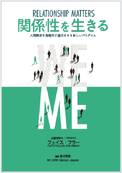
2024年12月25日発売!
関係性を生きる
RELATIONSHIP
MATTERS人間関係を飛躍的に
進化させる新しいパラダイム

WHAT IS SYSTEMS COACHING?

組織やチーム、家族やパートナーシップなど、あらゆる関係性を深く理解し、
より良い関係性の未来へと導くシステムコーチング/ORSC。
その定義および理論、学ぶことで得られる力についてご紹介いたします。
システム理論では、「個人はプライベートや職場などにおける人間関係のより大きなシステムの中に生きる一つのシステムである」と見なします。ORSC(=システムコーチング)は、「システム(=関係性)を構成するメンバーや個別の要素とは異なり、システム(=関係性)そのものの実体や場が他とは区別される形で存在する」と考えます。
システム理論とORSCとの関係性についての解説ページはこちら
プロセス指向心理学は、物理学者・ユング派の心理分析家であるアーノルド・ミンデルによって開発され、ユング心理学、物理学、そしてタオイズムからの影響を受けて生まれました。プロセスワークでは、タオイズムのように、今起きていることをただ紐解いていきます。例え目の前に起きていることが何であれ、それは何かが展開しようとする始まりにすぎず、すべての出来事や状況の中にはもともと智慧が備わっていると考えます。プロセスワークの観点に立ちながら、システムコーチはシステム(=関係性)に「何が起ころうとしているのか?」と問い続け、起きていること自体に内在する智慧とその有効性を信じて見守ります。
プロセス指向心理学(プロセスワーク)とORSCとの関係性についての解説ページはこちら
プロセス指向心理学の創始者であるアーノルド・ミンデルによって提唱されました。正しく現実を表すためには、あらゆる人のあらゆる声が必要であるという考えを具体化したものです。
世界は完全には理解されていないという自覚を持つことが重要であり前提にあります。個人においては、自分の中にあるすべての声、感情、動きに心を開くことを意味します。その「すべて」とは、自分がすでに知っていて自覚しているものだけでなく、恐れや、まだよく知らない要素も含まれます。
システムにおいては、すべてのメンバーの意見が尊重されることを意味します。
複数のチームや組織間では、それぞれの感情風土、文化、規範が異なっていることはごく普通のことですが、その違いを十分に扱わずに進んでしまうことで、行き違いや対立が生じるケースも多く見られます。
そのような場合に、感情風土や文化、規範といった内面的な要素を「国」のメタファーを用いて表現し、対話を行うことで、相互理解を促進するためのシステムコーチングのツールです。
ダニエル・ゴールマンは、感情的知性(EQ)を個人の感情を経験する力、特定する力、そして上手に表現する力と定義し、さらに社会的知性(SI)を他者の感情を正確に読み、共感する力と定義しています。
そして、EQ(感情的知性)やSI(社会的知性)を超えるところに、関係性システムの知性(以下、RSI)の領域があります。RSIにおいては、意識の焦点が自分自身や個々人のメンバーから個人、さらにはパートナーシップやチームといった、関係性そのもの、つまり有機体としてのシステム(=関係性)へと移ります。
言い換えるならば、RSIとは、目には見えないシステム(=関係性)に何が起きているのか、何を感じているのか、そして、今ここにある場、空気感、雰囲気を感じ取って言葉にできる力、さらに、そのシステム(=関係性)に効果的に働きかけることができる力を意味します。
感情的知性(EQ)・社会的知性(SI)とORSCとの関係性についての解説ページはこちら
RSIの詳細についてはこちら
外的役割とは、システム(=関係性)における目に見える、機能的側面の維持を目的とした表面的な役割です。例えば、家庭における外的役割には、料理、掃除、お金を稼ぐ、子どもの送迎などが含まれます。組織における外的役割は、社長、財務責任者、秘書といった職務として表れます。組織がうまく機能するためには、明確な外的役割(職務記述書や組織図)が欠かせません。
一方で、人と外的役割が同一化されたときに問題が生じます。例えば、幸子さんはいつも家族のために料理を作ってきたために、自他共に、幸子さん=料理人となってしまう可能性があります。しかし、実際には料理を作るのは幸子さんの役割であって、幸子さん自身ではありません。
役割は、個人ではなく、システム(=関係性)に属する機能として捉えます。そのため役割は、システム(=関係性)の中の誰か別の人によって担われる可能性もあるのです。
システムコーチは、クライアントメンバーがその役割のシステム(=関係性)にとっての重要さを理解し、メンバーの間でその役割をどのように果たしていくかを話し合い、合意していくことを助けます。
内的役割は、システム(=関係性)における目に見えない、感情的な側面を担う潜在的な役割です。私たちは内的役割について無自覚なことがよくあります。内的役割の背後には、大切な価値観が隠されています。例えば、新しい提案をする人、言いにくいことを言う憎まれ役、世話好きな養育者、愚痴の聞き役などです。このように、システム(=関係性)には内的役割が必要であり、システム(=関係性)を構成するあらゆる人が必要に応じてその役割を果たしています。
外的役割と同様に、人と内的役割が同一化されたときに問題が生じます。例えば、ある組織において、深刻な問題を提起するのはいつも山本さんだったとします。すると、他のメンバーは彼がいつもその役割を担うことを期待し始めます。システム(=関係性)は確かにこの「問題提起する人」という役割を必要としていますが、特定の人(山本さん)がそれを一手に担う必要はありません。もし、山本さんが組織を去ったとしたら、別の人がいつの間にかその役割を担うようになるでしょう。
システムコーチは、このようにシステム(=関係性)の中の様々な役割に気づき、そこに役割の固定からくる嫌悪感、混乱、新しい役割の必要性、満足に果たされていない役割などがあるかどうかに気づき、メンバーがより意識的に、自由自在に内的役割を分担できるように支援します。
すべての大切な人間関係には、例えそれがプライベートであれ、仕事であれ、お互いのつながりにまつわる神話や物語があります。お互いが出会ったそもそものきっかけを思い出すことで、まるで深い井戸から水をくみ出すように、肯定的なエネルギーが蘇るのです。神話とは「その関係に内在する深遠な意味」を指します。夫婦や恋人であれば、二人の出会いの瞬間を思い出したり、チームメンバーであれば、その会社やこの職業で働こうと思ったきっかけを思い出すことができます。
これは、プライベートでも職場の人間関係であっても、肯定性を促進するために最も強力な方法の一つです。私たちは、そのシステム(=関係性)とのつながりの原点を思い出すことで、お互いへの尊重、親愛、賞賛を思い出します。また、多忙や過労が当たり前になっている組織であっても、その仕事を始めたきっかけとなる原点とつながることで、クライアントの心は豊かさをとりもどし、仕事への情熱も回復します。
プロセスワークの創始者アーノルド・ミンデルによって提起された、物質がどのように量子レベルから日常の現実へと現れるのかを示したモデルのことです。私たちのあらゆる経験は、センシェント・エッセンス・レベル、もしくは量子レベルといわれる段階から始まります。それは、ドリーミング・レベル(夢のレベル)へと移り、最後に、形として認識できるコンセンサス・リアリティー・レベル(合意的現実レベル)として現れます。システム(=関係性)の中で起きることはすべて、同時にこの三つの現実レベルで起きています。そのため、システムコーチは、それぞれのレベルにおいて、今何が起きているかを認識し、働きかけることが大切です。また、システム(=関係性)が成長を遂げるためには、すべての3つのレベルが意識的に経験される必要があります。
プロセスワークの創始者アーノルド・ミンデルのパートナー、エイミー・ミンデルの提唱した概念を指します。メタスキルとは、システムコーチングにおいて、スキルを超えてシステムコーチが持つ「場」に影響を与える感情的姿勢や哲学などのことです。私たちは意識的であろうとなかろうと、常に「場」に影響を与えているということを理解しておく必要があり、システムコーチは自分が生み出している「場」に意識的、かつ意図的になるためにメタスキルを用います。
ワールドワーク(World Work)とは、アーノルド・ミンデルのプロセスワークに基づく概念で、個人から社会全体までを対象とし、個人の内面、チームや組織の関係性、さらには社会的・地球規模の課題に至るまで、あらゆるレベルで「システム」を一つの有機的なつながりとして捉えます。「システム全体に働きかけ、個人・組織・社会に存在する課題や対立を対話と協働を通じて変革へ導くアプローチ」を指します。
システムコーチは、身近な関係性の対立や課題から社会的・システム的課題などあらゆるテーマに対して、自分自身の感情や葛藤、無意識の偏見に向き合いながら、自分たちが世界の一部であり、世界を変える力も持っているという「関係性の力」を体現しながら関わり続けていきます。そして、そうした関係性に向き合い続ける人たちのことを「ワールドワーカー(World Worker)」と呼んでいます。
ワールドワーカー(World Worker)は、自らの日々の行動が世界の意識とつながり、相互に影響を与え合う場を創り出す人のことを指します。
コーファシリテーションは、二人以上のファシリテーター(コーチ・リーダー)が単に役割分担するのではなく、「関係性そのもの(第三の存在)をリソースとして活用し、場に影響を与える」という意味を持つアプローチです。信頼関係と協力を基盤にしながら、二人の関係性から生まれる協働の力を生み出し、多様な視点や強みを活かしてファシリテーションを行うことで、より豊かで効果的な場づくりが可能になります。
場面の目的に応じて、システムコーチングなどのコーチングセッションをする場面では「コーコーチ」、集団の場を導くためにリードする必要がある時には「コーリード」と呼ぶことがあります。ORSCの中で語られているいずれの言葉も、二人以上のメンバーが一つの生き物(第三の存在)のようにその場を共に生み出すことの総称のことを言っています。
二人以上の関係性やチーム、組織が生み出す「独自の存在」を指します。これは、単なる個人の集合体ではなく、そこに生まれる相互作用やエネルギー、知恵が合わさって形成される「関係性そのもの」を指します。
この第三の存在は関係性から生まれる独立した存在であり、二人以上の関係性やチームが形成されることで生まれる、目には見えない「関係性の実体」 です。例えば、パートナーシップやチームが持つ「空気感」や「雰囲気」、チームの価値観や文化も第三の存在の一部です。第三の存在は、関係者それぞれの要素の「単なる合計」ではなく、相互作用によって生まれる「全体としての力」や「知恵」を持ちます。
社会・環境活動家であり、仏教学者でもあるジョアンナ・メイシーが、「ディープ・エコロジー」という思想の中で提唱している考え方です。
「私たち人間は自然の一部であり、大きな輪の中に存在し、すべての生命が相互に繋がり合い、依存し合っている」と捉えます。自然という大きな輪の中に人間社会があり、その中にコミュニティがあり、さらに家族やグループが存在し、それらを作り出しているのは、個人としての自己であると考えています。
個人、チーム、組織、そしてより広いシステムの中で、お互いにとって健全で効果的な関係性を築くことを指します。ここでいう「正しい関係性」は、善悪や正解不正解ではなく、「その状況やシステムにおいて最も調和が取れている状態」 を意味します。
Right Relationship(正しい関係性)の状態が起こることにより、関係性の中で、お互いの意見や感情が尊重されることで、信頼と安心感が生まれます。また対立や問題に向き合うことで、関係性がより強く、成熟したものにもなっていきます。そして、お互いの関係性にエネルギーが流れ、システム全体が持っている総和以上の力を発揮できる状態になります。
コーチとの協働によって、クライアントが自身に焦点を当てることで生まれる意識の変化から行動変容を促す、コーチトレーニング機関CTIの独自のコーチング手法です。
スポーツコーチのようなアドバイスではなく、コーチングスキルを通じて、クライアント自身の意識の変化につながる対話をします。コーチ自身もありのままの姿でクライアントに関わり、協働的な関係を築き、クライアントの価値観や行動を妨げる思考パターンを共に発見し、意識と行動の変化を呼び起こします。コーアクティブ・コーチング®は、どの人も根源的に願っていることー日々充実感を感じながら、自ら人生の主導権を握り、人生の目的に沿って生きることーを可能にし、クライアントが自ら、様々な環境や状況に応用できる持続可能な力を培うコーチングです。
コーアクティブ®・コーチングは、株式会社ウエイクアップ CTI ジャパンの登録商標です。
コーチングのプロフェッショナリズムを確立し、コーチング業界全体の質を高めることを目的とした、国際的な非営利団体です。1995年に設立され、世界中のコーチやコーチング組織をサポートする代表的な機関の一つとして機能しています。国際コーチング連盟(ICF)はコーチングを「クライアントと協働し、思考を促し、クライアント自身の可能性を最大限に引き出すためのパートナーシップ」と定義しています。また、コーチングの質を担保するためのコア・コンピテンシー(必須能力)と倫理基準を設定しています。
詳細情報や最新情報についてはこちらをご確認ください。
システム・インスパイアード・リーダーシップ(Systems Inspired Leadership (SIL) )は、リーダーシップの新しいアプローチとして、従来の「トップダウン型」「リーダーがすべての答えを持つ」という考え方を超え、チームや組織内のすべての声やリソースを引き出し、協働と共有リーダーシップを通じて最適な結果を導き出していくリーダーシップの考え方であり、手法です。関係性システム全体の力を活かし、チームや組織の潜在能力を引き出すことで、持続的な成長と変革を実現する新しいリーダーシップの在り方です。
詳細情報や最新情報についてはこちらをご確認ください。